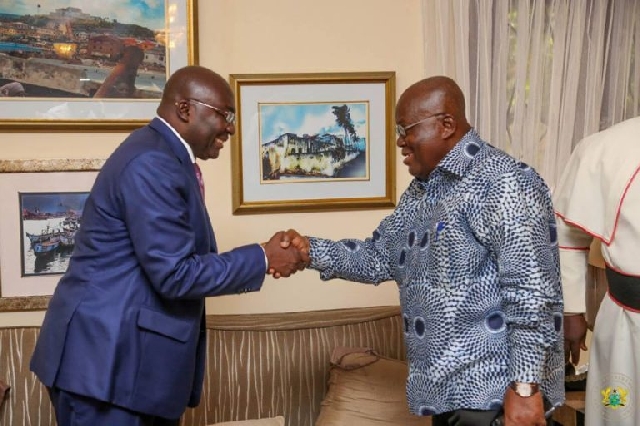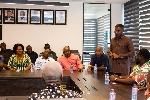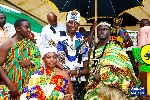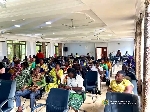The most marketed political product does not always translate to voter acceptability – Razak Kojo Opoku reveals
 Dr Bawumia and Nana Akufo-Addo
Dr Bawumia and Nana Akufo-Addo
Political analyst and researcher and leading member of the New Patriotic Party(NPP), Dr. Razak Kojo Opoku, has argued that being the “most marketed” political candidate does not necessarily guarantee voter acceptability during elections.
In a statement issued under the auspices of the UP Tradition Institute, Dr. Opoku drew parallels between commercial product failures and political campaigns, stressing that popularity and visibility are not always synonymous with success at the polls.
He noted that in the business world, many heavily marketed products eventually failed despite aggressive promotion.
He cited examples such as Kasapa Mobile and Glo Mobile in Ghana, as well as international product flops like Google Glass, Apple Newton, Microsoft Zune, Nokia, Motorola, Crystal Pepsi, HP TouchPad, and Burger King’s Satisfries.
Applying the same analogy to politics, Dr. Opoku listed several political figures across Africa and beyond who enjoyed heavy publicity and popularity but failed to secure electoral victory.
These included Raila Odinga (Kenya), Atiku Abubakar (Nigeria), Morgan Tsvangirai (Zimbabwe), Anthony Leon (South Africa), Julius Malema (South Africa), Bobi Wine (Uganda), Martin Fayulu (DR Congo), Diane Rwigara (Rwanda), Al Gore (USA), Hillary Clinton (USA), Kamala Harris (USA), and Marine Le Pen (France) among others.
Dr. Opoku further highlighted Ghanaian examples, pointing out politicians who have contested multiple elections without significant voter acceptance.
These included Edward Mahama of the PNC, Thomas Nuako Ward-Brew, Dr. J. B. Danquah of the UGCC/UP tradition, and Paa Kwesi Nduom.
He also referenced Muhammadu Buhari of Nigeria, who had to contest the presidential elections four times before finally winning, as an illustration of how persistence sometimes pays off despite repeated electoral setbacks.
According to Dr. Opoku, the “psychology of voters” often overrides marketing strategies, meaning that public perception, trust, and socio-political realities play a greater role in determining electoral outcomes than media presence or campaign spending.
“Being the most marketed does not and may not always end in voter acceptability.
The psychology of voters can easily make nonsense of the ‘most marketed’ slogan during general elections,” he stated.
The political scholar concluded by urging politicians and campaign strategists to pay closer attention to voter behaviour and grassroots dynamics, rather than over-relying on publicity and brand marketing in their bid for political power.
Source: classfmonline.com/Cecil Mensah
Trending News

UE/R: Talensi miners accuse NDC gov't of betrayal over mining crackdowns
11:48
Ghana International School marks 70 years of educational excellence
15:50
Ketu North leaders strengthen ties with appointees to drive development
11:37
TAGG calls for urgent procurement of modern presidential aircraft
13:15
IGP interact with high-risk trained officers ahead of Akwatia by-election
10:27
AMA launches energy efficiency campaign to cut costs and curb carbon footprint
15:29
PAC orders Finance Minister to probe GRA over GH¢2.9m unrecovered funds
15:34
Afenyo-Markin urges Asante students to harness their heritage for national development
06:42
Eastern RCC holds refresher workshop for 74 local government officers ahead of PSC exams
12:42
President Ruto hails Zoomlion’s bold waste solutions at Kenya DevCon2025
10:05




